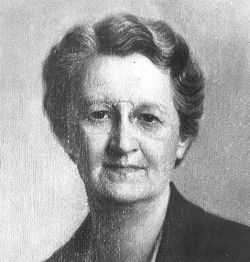
Loraine Bedsole Tunstall was the first woman in the state of Alabama appointed to head a department in the state government. When the legislature created the Child Welfare Department in 1923, she was appointed its first director, holding that position until her retirement in 1935.
Prior to being named to this position, Tunstall had worked intensively in the field of social services to children. From 1915 to 1917, she was the first child labor inspector in Alabama. During the next two years she worked with the United States Department of Labor with responsibility for the enforcement of the first federal child labor law. In 1919 as a member of the National Child Labor Committee she worked with several state legislatures in the passage of legislation beneficial to children. It is to her credit that her own home state also passed its first beneficial legislation on this question during this time.
During the time that Tunstall was director of the State Child Welfare Department, she was instrumental in the development of legislation covering juvenile court, adoption procedures, standards of care for child care institutions and agencies, placement of children, and child labor. Implementing the 1923 legislation which created the department she headed, county child welfare boards were established with direct relation to the Social Child Welfare Department.
Not only was Tunstall closely identified with the development of sound child welfare practices in Alabama, she was known nationally for her application of sound social work philosophies. She was a member of committees of the National Conferences of Social Work, a member of the Board of the American Public Welfare Association, and a member of the White House Conference of 1930.
Between 1932 and 1934, Tunstall laid the foundation for Alabama being the first state to be ready to initiate the federal relief program legislated in 1934. In 1935 when federal social security legislation was passed, again through Tunstall's leadership, Alabama became the first state to pass enabling laws to implement the program.
Qualified personnel were essential for the implementation of social services for children, and Tunstall initiated a plan of cooperation with educational institutions to provide that personnel. Foremost for her, however, was a sound philosophy and implementation that children and their needs came first. She established a tradition in Alabama that social services should be provided even in the remotest parts of the state, so that no child would be deprived by the geography of his birth. This is the living evidence of Tunstall's influence on behalf of children in Alabama and America.
Bibliography
Adams, Bess. “Alabama Conference of Social Work; A Brief History, 1901-1966.” 35p. Brochure.
Bender, Doris. “Developments in Services to Children by Local Public Welfare Agencies.” Report submitted to Mrs. Tunstall, 16 May 1951. (Typewritten.)
“Fair Graduates Receive Diplomas at the Atheneum.” Typewritten copy of 1896 newspaper article. Private Bedsole Collection.
Gresham, Judith. “A Tribute to the late Loraine Bedsole Tunstall presented at First General Session Alabama Conference of Social Work, April 22, 1955.” Printed in the Alabama Conference of Social Work newsletter, Scratch Pad, 17 April 1959.
-----. “Loraine Bedsole Tunstall.” Alabama Social Welfare 18 (September 1953): 9.
Hayes, Bess Harwell. Letter to Loraine Tunstall, 29 November 1950. Private Bedsole Collection.
“Mrs. Tunstall and Gov. Kilby.” Anniston Star, 23 August 1933.
“Mrs. Tunstall Nominated for Alabama Women’s Hall of Fame.” Greensboro Watchman, 31 January 1974.
Owen, Marie B. Letter to J.L. Bedsole, 18 August 1953. Private Bedsole Collection. (Note: The date on Mrs. Owen’s letter is wrong. She refers to the death of Mrs. Tunstall, which occurred on 19 August 1953.)
“Presentation of Portrait of Loraine Bedsole Tunstall.” Printed program dated 7 June 1945.
![]() Other Inductees
Other Inductees
![]() Alabama Women's Hall of Fame
Alabama Women's Hall of Fame